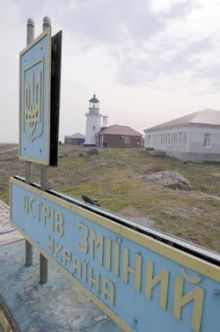Ukraine is satisfied with the ruling of the UN International Court of Justice in the case of delimitation of the continental shelf and exclusive economic zone between Ukraine and Romania in the Black Sea, said Deputy Minister of Foreign Affairs of Ukraine Oleksandr Kupchyshyn, addressing the journalists gathered in the Hague. “It is very important that the last problem situation has been removed from the Ukraine-Romania relations. The line is a compromise, and the court decision is binding for both sides,” UNIAN quotes the deputy minister as saying.
According to the court decision, Zmiiny is recognized as an island with territorial waters stretching from it for 12 nautical miles, but at the same time it is not acknowledged as a relevant circumstance for expanding Ukraine’s exclusive economic zone.
This case was initiated by Bucharest and has remained in the court since 2004. On May 16, 2006, Ukraine filed a counterclaim to the UN International Court of Justice. The Romanian side appealed to court because it believed that Zmiiny is a rock rather than an island. Ukraine argued that Zmiiny is an island and that Ukraine’s part of the shore along the disputed territory is 1,058-kilometer-long, whereas Romania has 258 kilometers of the shoreline. Correspondingly, the Ukrainian side believed that the disputed territory of the shelf should be divided in a 1 to 3 proportion, 53,300 square kilometers for Ukraine and 21,900 — for Romania.
Deputy Head of the Razumkov Center Valerii CHALY commented on the court decision for The Day:
“First of all, the ruling of the ICJ confirms that the sides have no territorial claims to each other.
“The decision approved by the Hague Court may be called a compromise. Assessments on whether it is a victory or defeat will be quite opposite in Ukraine and Romania. Besides, one should take into consideration the fact that different political forces in Ukraine will assess the resolution differently.
“Of course, this decision is neither a catastrophic defeat nor a triumphant victory. Technically speaking, Zmiiny was finally recognized as an island. But, on the other hand, it was not recognized as an object that is a factor in extending Ukraine’s coastal line, and correspondingly, the maritime boundary line, which was drawn somewhere between the points Ukraine and Romania desired.
“Assessing the results both sides achieved in court, I can say that the Romanian diplomats achieved much more in their line of claim upon which they insisted since the beginning. The court rejected Ukraine’s arguments with regard to the coastal line, continental shelf, and exclusive economic zone. However, territorial waters were kept around Zmiiny Island.
“Essentially no decision was adopted on Ukraine’s line of argumentation. Romanians were more successful in arguing for the expansion of their exclusive economic zone. But I would not regard this decision as [our] defeat. The result of the trial is that the states now have one more question closed, which enables them to focus on cooperation.
“I can say that it was very complicated for Ukraine to reach the desired result, even for such a professional team, which included both Ukrainian and foreign experts. Did they choose a correct line at court? To answer this question one should give a response to the following ones. First, how do we go about defending Ukraine’s position through this kind of avenues? Second, how public and transparent can and should this process be? How should social support be gained? Third, how can we develop an absolutely unified position of all political forces and government institutions on each question that affects Ukraine’s image abroad? In my opinion, the discussion, which I expect to ensue in the following days, will be much more harmful for Ukraine’s image than the compromise decision of the Hague Court.”








